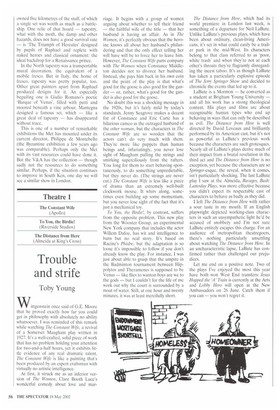Trouble and strife
Toby Young
Wittgenstein once said of G.E. Moore that he proved exactly how far you could get in philosophy with absolutely no ability whatsoever. I was reminded of this remark while watching The Constant Wife, a revival of a Somerset Maugham play written in 1927. It's a well-crafted, solid piece of work that has no problem holding your attention for two-and-a-half hours, yet it exhibits little evidence of any real dramatic talent, The Constant Wife is like a painting that's been produced by an expert craftsman with virtually no artistic intelligence.
At first, it struck me as an inferior version of The Women, Clare Booth Luce's wonderful comedy about love and mar riage. It begins with a group of women arguing about whether to tell their friend — the faithful wife of the title — that her husband is having an affair. As in The Women, it's perfectly obvious that the heroine knows all about her husband's philandering and that the only effect telling her will have will be to force her to leave him. However, The Constant Wife parts company with The Women when Constance Middleton decides not to divorce her husband. Instead, she pays him back in his own coin and the point of the play is that what's good for the goose is also good for the gander — or, rather, what's good for the gander is also good for the goose.
No doubt this was a shocking message in the 1920s, but it's fairly mild by today's standards, Jenny Seagrove makes a decent fist of Constance and Eric Carte has a hilarious cameo as the outraged husband of the other woman, but the characters in The Constant Wife are so wooden that the actors can't do very much with them. They're more like puppets than human beings and, infuriatingly, you never lose sight of Maugham pulling the strings and smirking superciliously from the rafters. You long for them to start behaving spontaneously, to do something unpredictable, but they never do. (The strings are never cut.) The Constant Wife is less like a piece of drama than an extremely well-built clockwork mouse. It whirs along, sometimes even building up some momentum, but you never lose sight of the fact that it's just a mechanical toy.
To You, the Birdie!, by contrast, suffers from the opposite problem. This new play from the Wooster Group, an experimental New York company that includes the actor Willem Dafoe, has wit and intelligence to burn but no real story. It's based on Racine's Phedre, but the adaptation is so loose it's impossible to follow if you don't already know the play. For instance, I was just about able to grasp that the umpire in the Badminton tournament between Hippolytos and Theramenes is supposed to be Venus — like flies to wanton boys are we to the gods — but I couldn't for the life of me work out why the court is surrounded by a moat of water. Still, at one hour and twenty minutes, it was at least mercifully short. The Distance from Here, which had its world premiere in London last week, is something of a departure for Neil LaBute. Unlike LaBute's previous plays, which have been about ordinary, clean-living Americans, it's set in what could easily be a trailer park in the mid-West. Its characters belong to that class referred to as 'poor, white trash' and when they're not at each other's throats they're flagrantly disregarding the incest taboo. It's as though LaBute has taken a particularly explosive episode of The Jerry Springer Show and decided to chronicle the events that led up to it.
LaBute is a Mormon — he converted as a student at Brigham Young University — and all his work has a strong theological content. His plays and films are about recognisable human types who end up behaving in ways that can only be described as evil. The Distance from Here is well directed by David Leveaux and brilliantly performed by its American cast, but it's not as powerful as LaBute's previous work because the characters are such grotesques. Nearly all of LaBute's plays derive much of their impact from a brutal revelation in the third act and The Distance from Here is no exception, yet because the characters are so Springer-esque, the reveal, when it comes, isn't particularly shocking. The last LaBute play I saw at the Almeida, Ravages, Bash: Latterday Plays, was more effective because you didn't expect its respectable cast of characters to behave as badly as they did.
I left The Distance from Here with rather a sour taste in my mouth. If an English playwright depicted working-class characters in such an unsympathetic light he'd be accused of snobbery and I'm not sure LaBute entirely escapes this charge. For an audience of metropolitan theatregoers, there's nothing particularly unsettling about watching The Distance from Here. In an uncharacteristic lapse, LaBute has confirmed rather than challenged our prejudices.
Let me end on a positive note. Two of the plays I've enjoyed the most this year have both won West End transfers: Jesus Hopped the 'A' Train is currently at the Arts and Lobby Hero will open at the New Ambassadors on 26 June. Catch them if you can — you won't regret it.














































































 Previous page
Previous page